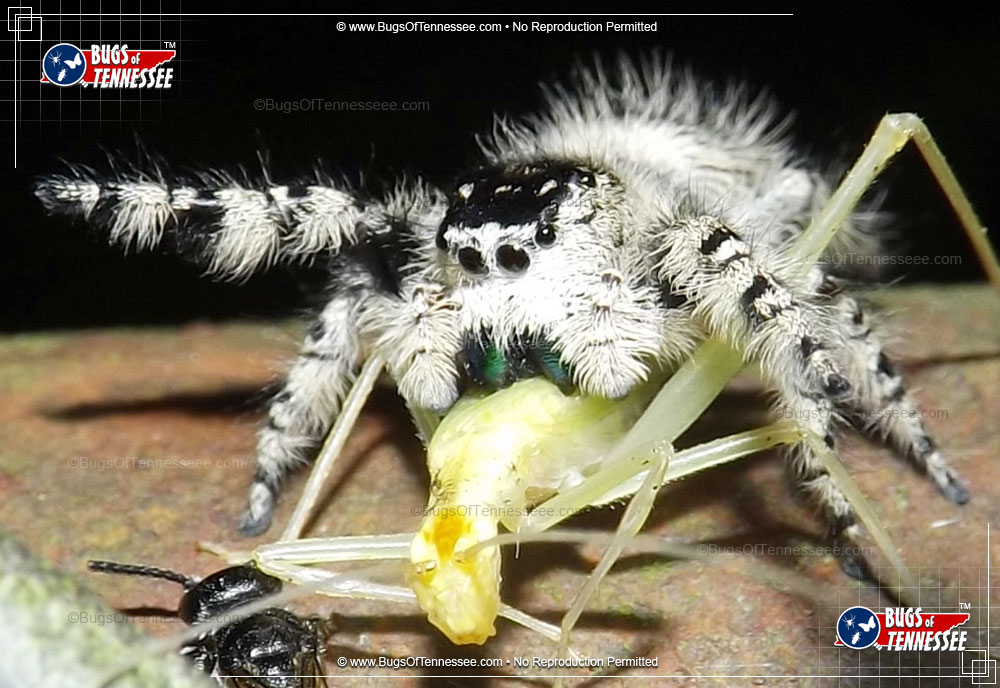Insect Order (Araneae)
ARANEAE (SPIDERS)
Araneae, comprising spiders, are one of the most intimidating orders of insects to the casual observer. This predatory group is made up of roughly 3,400 species in the United States and Canada. Some are webspinners while others are not, and some are completely harmless (and beneficial) while others are not. Classic examples of spiders include garden-loving Orb Weavers, the common House Spider, the identifiable Black Widow, the mighty Wolf Spider, and the venomous Brown Recluse. Eight legs typically differentiate Araneae insects from other orders.
Taxonomy
The Taxonomic Breakdown is the scientific way to categorize a partocular insect species from its largest group (Animalia) to its smallest (variable). The Genus and Species categorizations taken together make up the species' scientific name shown above, in this case Phidippus otiosus.
Kingdom: Animalia
Phylum: Arthropoda
Class: Arachnida
Order: Araneae
Family: Salticidae
Genus: Phidippus
Species: otiosus
Characteristics
Abdomen: Has a noticeably large / oversized abdomen.
Indoors: Can be found indoors; inside dwellings.
Outdoors: Typically found across the great outdoors.
Eight-Legged: Eight legs are common to this insect.
Small / Tiny: Noticeably small to the naked eye.
Description
The Canopy Jumping Spider has been identified by site users by the following descriptors:
black white grey gray yellow eight-legged outdoors indoors hairy fuzzy eyes abdomen fast agile jumping small
Sighting Guide
The general likelihood of encountering this insect based on a given month of the year in the state of Tennessee. Generally, the best sighting months are June through August with peak occurring in July.
Size
Below is a representation of the 'smallest-small' and 'largest-large' sizes commonly associated with the Canopy Jumping Spider. Due to monitor differences, sizes may not be exact on your particular screen. Conversions to millimeters are provided for convenience.
Lowest-Low:
0.31 inches
(8 mm)
Highest-High:
0.71 inches
(18 mm)
Diet
It has a typical diet of the following: Other Insects.
Identifying Colors
Below you will find the colors most commonly associated with the Canopy Jumping Spider. Both Primary and Secondary colors are represented in the showcase. Due to monitor differences, colors may not be exact representations.
Tennessee County Reach
The Canopy Jumping Spider can be found in the following Tennessee counties:
Anderson; Bedford; Benton; Bledsoe; Blount; Bradley; Campbell; Cannon; Carroll; Carter; Cheatham; Chester; Claiborne; Clay; Cocke; Coffee; Crockett; Cumberland; Davidson; De Kalb; Decatur; Dickson; Dyer; Fayette; Fentress; Franklin; Gibson; Giles; Grainger; Greene; Grundy; Hamblen; Hamilton; Hancock; Hardeman; Hardin; Hawkins; Haywood; Henderson; Henry; Hickman; Houston; Humphreys; Jackson; Jefferson; Johnson; Knox; Lake; Lauderdale; Lawrence; Lewis; Lincoln; Loudon; Macon; Madison; Marion; Marshall; Maury; McMinn; McNairy; Meigs; Monroe; Montgomery; Moore; Morgan; Obion; Overton; Perry; Pickett; Polk; Putnam; Rhea; Roane; Robertson; Rutherford; Scott; Sequatchie; Sevier; Shelby; Smith; Stewart; Sullivan; Sumner; Tipton; Trousdale; Unicoi; Union; Van Buren; Warren; Washington; Wayne; Weakley; White; Williamson; Wilson
Canopy Jumping Spider Picture (1)
1 of 1

Close-up detailed image view of a Canopy Jumping Spider with prey.; Credit: Alex B. of Kentucky, USA.
This image is original to
www.InsectIdentification.org; Used with Permission.
